(Download PDF)
I have encountered a Messianic Jewish teaching that states that only the Jewish people are obligated to keep Torah, because they are circumcised. Is this what Galatians 5:2-3 really communicates? I am confused.
“Behold I, Paul, say to you that if you receive circumcision, Messiah will be of no benefit to you. And I testify again to every man who receives circumcision, that he is under obligation to keep the whole Law” (Galatians 5:2-3).
It is true that in various sectors of Messianic Judaism, particularly those which promote a bilateral ecclesiology of the Kingdom of God composing two sub-groups of elect, Israel and “the Church,” that it is believed that only Jewish people are really supposed to follow the Torah. Non- Jewish Believers can keep the Torah if they wish, but it is not required or really expected of them.a Galatians 5:2-3 is offered as a proof text in support of this position, as the non-Jewish Galatians who would be circumcised in the First Century, would apparently make themselves obligated, the same as any Jew, to keep the Torah.
Is this interpretation of Galatians 5:2-3, a viable one? According to one rather popular Messianic teacher, at least: “Galatians 5:3 is irrefutably simple to understand.” He goes on to conclude, “If the plain meaning of the text is true” then “every person who is not Jewish is not obligated to keep the whole Torah.”b When one encounters any remark or statement, by any Bible teacher, on any topic,c to the effect that something is “irrefutably simple,” “airtight,” “watertight,” or “fireproof”—be careful because this is a very good indication that there has not been enough detailed examination of the subject.d What is required, for adequately evaluating what Galatians 5:2-3 communicates, is not only placing these two verses within a wider scope of statements seen in Paul’s letter, but going into more detail from the Greek source text and adequately triangulating a variety of scholastic perspectives.
Is it possible that the Messianic Jewish view of only the Jewish people being “obligated” to keep the Torah, based on Galatians 5:2-3, has not probed the text enough? Galatians 5:2-3 are actually not easy verses to evaluate, partially because Paul says “I testify again…,” a clue that he could be repeating remarks previously made when he visited the Galatians in person (cf. Acts 13:13-14:28). In Galatians 5:2-3, we are certainly reading the Galatians’ mail, and are interjecting ourselves into an ancient problem.
Textually speaking from the English alone, the immediate cotext of Galatians 5:1, 4 gives us some important clues as to the setting Paul addresses, regarding why he is insistent that the non-Jewish Galatians do not go through circumcision:
“It was for freedom that Messiah set us free; therefore keep standing firm and do not be subject again to a yoke of slavery. Behold I, Paul, say to you that if you receive circumcision, Messiah will be of no benefit to you. And I testify again to every man who receives circumcision, that he is under obligation to keep the whole Law. You have been severed from Messiah, you who are seeking to be justified by law; you have fallen from grace.”
Galatians 5:1, 4 indicates that the issue in view is the non-Jewish Galatians having been freed from slavery to sin, and by going through circumcision, they would be returning to a spiritual condition that they should have left behind in paganism (cf. Galatians 4:8).e While in other places in Galatians, it is easily discerned that the “justification” in view regards one’s identity as a member of God’s people (Galatians 2:15), the “justification” seen in Galatians 5:4 has to regard the Galatians’ salvation status as well. Those Galatians, who would go through circumcision, are to be considered as having fallen from grace.
One significant feature of the “circumcision” (Grk. verb peritemnō) referenced throughout much of Galatians—but most specifically here—is how those of both the male and female genders are in view. Galatians 5:3 says, panti anthrōpō peritemnomenō. While it may seem rather strange to us, this clause is best rendered with “every human being who receives circumcision,” as the generic anthrōpos for humankind is employed. Realizing that both the male and female genders are in view, the “circumcision” spoken of throughout much of Galatians has very little to do with a medical operation on the glans penis, but instead has to do with the ritual of an ancient proselyte to Judaism. “Circumcision” in Galatians may largely be considered a shorthand way of Paul saying: “become a Jewish proselyte/convert.” Becoming an ancient proselyte to Judaism involved circumcision, water immersion, and the presentation of an offering (b.Keritot 9a).f Females becoming Jewish proselytes partook of the latter two.
Interpreters of various positions on Galatians 5:1-4 should be able to recognize that the Apostle Paul is not criticizing circumcision as a medical practice here. What Paul is directly going after, though, is an inappropriate theology of circumcision present within much of First Century Judaism. Being ritually circumcised as a proselyte to Judaism, will not merit one a proper standing before the Creator God. Yet, the Judaizers/Influencers, who had been agitating the non-Jewish Galatians, did advocate that becoming a Jewish proselyte was necessary to be a genuine part of the people of God, and possess eternal salvation (cf. Acts 15:1).
A standard position that is seen of Galatians 5:2-3, only slightly modified by some leaders in today’s Messianic Jewish movement, is that the non-Jewish Galatians being circumcised would make them be obligated to keep the Torah. This is something witnessed in the views of Galatians commentators:
- Bruce: “Circumcision as a minor surgical operation is neither here nor there, but circumcision voluntarily undertaken as a legal obligation carries with it a further obligation—nothing less than the obligation to keep the whole law. He who submits to circumcision as a legal requirement, necessary for salvation, accepts thereby the principle of salvation by law-keeping, and salvation by law-keeping implies salvation by keeping the whole law.”g
- Richard Longenecker: “Paul wants to make it plain that with circumcision comes obligation ‘to obey the whole law.’”h
There are interpreters who hold the doing of the Torah in Galatians 5:3 as a matter of what identified ancient Jews,i and various others who will look at the doing of the Torah in Galatians 5:3 as a matter of the non-Jewish Galatians trying to earn their salvation. The correct interpretation of Galatians 5:3, regarding the matter of the Torah, has to weigh Paul’s rather severe warning of telling the non-Jewish Galatians that they will be cut off from grace (Galatians 5:4). The doing of the Torah in Galatians 5:3, as only some matter of obligated Jewish identity, does not at all serve as an adequate counterweight to being cut off from grace or salvation. A loss of God’s favor present in Yeshua’s sacrifice is in view.
Examining the statement, “I testify again to every man who receives circumcision that he is bound to keep the whole law” (Galatians 5:3, RSV), there have been some key suggestions made that the language employed here might have to do with some kind of oath taking. Hans Dieter Betz observes, “The formula of oath seems to be in place because of the stubbornness of the Galatians who, in spite of what they have been told before, remain naive with regard to the implications of becoming circumcised.”j Ben Witherington III also indicates how “A close examination of Ancient Near East covenanting procedures, including those followed by the Israelites, shows that the sign of a covenant was often connected with the oath curse that went with the covenant, in fact symbolized the curses that applied if one didn’t obey the covenant stipulations.”k Both Betz and Witherington have interjected some thoughts into what Galatians 5:3 may certainly involve, which can better aid us in understanding why the non-Jewish Galatians being circumcised as proselytes, would be tantamount to them being cut off from God’s grace in Yeshua.
Mark Nanos makes note of “a custom practiced in rabbinic Judaism, wherein the proselyte candidate must declare awareness of the afflictions suffered by Israelites and the responsibility to uphold Torah upon completion of the rite,”l referring to the procedure in the Talmud:
“Our rabbis have taught on Tannaite authority: A person who comes to convert at this time— they say to him, ‘How come you have come to convert? Don’t you know that at this time the Israelites are forsaken and harassed, despised, baited, and afflictions come upon them?’ If he said, ‘I know full well, and I am not worthy [of sharing their suffering],’ they accept him forthwith. And they inform him about some of the lesser religious duties and some of the weightier religious duties. He is informed about the sin of neglecting the religious duties involving gleanings, forgotten sheaf, corner of the field, and poorman’s tithe. They further inform him about the penalty for not keeping the commandments. They say to him, ‘You should know that before you came to this lot, if you ate forbidden fat, you would not be penalized by extirpation. If you violated the Sabbath, you would not be put to death through stoning. But now if you eat forbidden fat, you are punished with extirpation. If you violate the Sabbath, you are punished by stoning.’ And just as they inform him about the penalties for violating religious duties, so they inform him about the rewards for doing them. They say to him, ‘You should know that the world to come is prepared only for the righteous, and Israel at this time is unable to bear either too much prosperity or too much penalty.’ They do not press him too hard, and they do not impose too many details on him. If he accepted all this, they circumcise him immediately. If any shreds that render the circumcision invalid remain, they do it a second time. Once he has healed, they immerse him right away. And two disciples of sages supervise the process” (b.Yevamot 47a-b).m
Here, it cannot go overlooked how the proselyte candidate formally joining the Jewish community would have to acknowledge penalties for Torah breaking to be incurred.
To this, we have to consider how significantly possible it is that Galatians 5:3 includes an echo of an oath commitment that proselytes to Judaism would have been forced to take, in order for them to be steadfastly committed to keeping the whole Law. This certainly does have a precedent, as the returned Jewish exiles from Babylon made a public commitment to not only keep the Torah, but actually be cursed, if they were ever found disobeying any of its instructions:
“Now the rest of the people, the priests, the Levites, the gatekeepers, the singers, the temple servants and all those who had separated themselves from the peoples of the lands to the law of God, their wives, their sons and their daughters, all those who had knowledge and understanding, are joining with their kinsmen, their nobles, and are taking on themselves a curse and an oath to walk in God’s law, which was given through Moses, God’s servant, and to keep and to observe all the commandments of GOD our Lord, and His ordinances and His statutes” (Nehemiah 10:28-29).
For the First Century Jewish Synagogue, it is not difficult at all to envision various religious authorities requiring proselytes to make a vow to keep the whole Torah, and in the process for such proselytes to acknowledge curses crashing down upon them for breaking it in any way. Given the significance that many of today’s Pauline scholars have given to Paul’s usage of “works of law” in Galatians (2:16 [3x]; 3:2, 5, 10) and the Qumran document 4QMMT,n it should not be surprising that the Qumran community required its members to make an oath to keep the Torah of Moses, and in the process be reminded that God’s wrath would come down upon any of those who would break it:
“These are the regulations that govern when they are gathered together as a community. Every initiant into the society of the Yahad is to enter the Covenant in full view of all the volunteers. He shall take upon himself a binding oath to return to the Law of Moses (according to all that He commanded) with all his heart and with all his mind, to all that has been revealed from it to the Sons of Zadok—priests and preservers of the covenant, seekers of His will—and the majority of the men of their Covenant (that is, those who have jointly volunteered for His truth and to live by what pleases Him). Each one who thus enters the Covenant by oath is to separate himself from all of the perverse men, those who walk in the wicked way, for such are not reckoned a part of His Covenant. They ‘have not sought Him nor inquired of His statutes’ (Zeph. 1:6) so as to discover the hidden laws in which they err to their shame. Even the revealed laws they knowingly transgress, thus stirring God’s judgmental wrath and full vengeance: the curses of the Mosaic Covenant. He will bring against them weighty judgments, eternal destruction with none spared” (1QS 5.7-13).o
It is entirely reasonable to propose that Galatians 5:3 includes an embedded reference to some kind of oath for ancient Jewish proselytes to keep “the whole Law”. The proselyte procedures the non-Jewish Galatians would go through, would be administered by non-Messianic authorities, people who did not believe in Yeshua and would not take into consideration the new status of human beings in Him (Galatians 3:28). (The Influencers’ error themselves, as addressed throughout the Epistle to the Galatians, was in making ritual proselyte circumcision an issue for entry into God’s people, and not faith in the Messiah and His accomplishments.) And in the case of whatever sect of ancient Judaism may have been administrating the proselyte circumcision procedure, Betz notes that to the Qumran community “keeping the whole Torah meant for them additional requirements, which made their observance more radical than that of ordinary Jews.”p More than just observing commandments of the Pentateuch proper, with “the whole Law,” could be intended.
While being ritually circumcised as a Jewish proselyte, and in the process making an oath to keep the whole Torah, could very well be what is more fully involved in Galatians 5:3—why would Paul be so strident to tell the non-Jewish Galatians: “you who are seeking to be justified by law; you have fallen from grace” (Galatians 5:4; cf. 2:21)? He could have just said something to the effect, “You are misguided” or “You are deceived” or “You have gone astray” here, because being circumcised is surely a Torah commandment—and one which Paul himself says later has value (cf. Romans 3:1-2).
An extremely important, albeit quite obvious component, to properly understanding Galatians 5:3, “he is under obligation to keep the whole Law” (NASU), is actually reading what the Greek source text says: hoti opheiletēs estin holon ton nomon poiēsai. While most contemporary English translations have something along the lines of “under obligation” (NASU) or “obligated” (NIV/NRSV/ESV/HCSB), these renderings communicate the sense of a verb, when a noun is actually what appears in the source text. While Jews and Messianic Jews being “obligated to keep Torah,” has become a prolific sound byte in some quarters, based on Galatians 5:3—what if “under obligation” is not at all the best translation for what is witnessed in the Greek source text? Not enough interpreters have adequately examined what the Greek actually says.
The Greek noun opheiletēs (ovfeile,thj), in its most basic sense, means “a debtor” (LS).q While it can mean “one who is under obligation in a moral or social sense,” it can also mean “one who is in debt in a monetary sense,” as well as “one who is guilty of a misdeed, one who is culpable, at fault,” “in relation to God, sinner” (BDAG).r The term opheiletēs appears in Matthew 6:12, where Yeshua directs His disciples to pray, “And forgive us our debts, as we also have forgiven our debtors.” In the view of TDNT, “those who accept circumcision are debtors to the whole law,”s and no one can deny how in the KJV/NKJV, opheiletēs is translated with “debtor”: “that he is a debtor to do/keep the whole law.”t (The Brown and Comfort interlinear has rendered hoti opheiletēs estin holon ton nomon poiēsai as “that he is~a debtor whole the law to do.”)u
The proper rendering of opheiletēs as “debtor” makes good sense, in light of the inference that the non-Jewish Galatians who are circumcised as proselytes will fall from grace. Their motives are clear: they “are seeking to be justified by law [lit. ‘in law’; en nomō]” (Galatians 5:4). Does this mean that these people will find themselves no longer seeking justification in the Messiah and what He has accomplished? It has to mean this, in order for their circumcision to merit their being cut off from God’s grace in Yeshua. If membership in God’s people via ritual proselyte circumcision were only in view in Galatians 5:2-3, then one would expect the Galatians being accused of only being misguided or deceived. Most critical to be recognized, is how the condition of a “debtor” in the Apostolic Scriptures, is often that of a person who lives in an unredeemed condition of sin and guilt. James D.G. Dunn indicates for readers,
“The play on words between verses 2 and 3 should be noted: Christ will not benefit them (ōphelēsei), but, instead, they will be in debt (opheiletēs) to the law.”v Inevitably in seeking to be justified via their Torah observance, the Galatians will find themselves breaking it, and will subsequently be debtors who have fallen from the grace they once had in Yeshua (cf. Galatians 6:13 on the behavior of the Judaizers/Influencers).
A picture of Galatians 5:2-3 should be forming, which has: adequately taken into consideration First Century Jewish background, the Greek source text, and the reality that the non-Jewish Galatians who become ritually circumcised as proselytes will be cut off from God’s grace in Yeshua. Consider this interpretation of Galatians 5:2-3:
- The “circumcision” in view has been required by the Judaizers/Influencers in order for the Galatians to be “really” reckoned as members of God’s
- Paul says that if the Galatians go through with this, then they will be regarded as debtors to keep the whole
- Being a debtor to the Torah, could very well have involved some kind of a loyalty oath that the proselyte would have to exclaim, something with precedents witnessed in Jewish history, and with it severe penalties acknowledged to be incurred for Torah-breaking. One who is found to break the Torah then (cf. James 2:10), as a debtor, would call God’s curses and wrath
- Why would being regarded as a “debtor to do the Torah,” merit being cut off from God’s grace in Yeshua? Because in Yeshua, born again Believers are to no longer be regarded as such He has freed all redeemed men and women from the curse of the Torah declared upon Torah-breakers (Galatians 3:13). To regard oneself as some kind of “debtor to do the Torah,” and if found breaking the Torah incur its curse, would be tantamount to the Galatians saying that Yeshua had not really broken the curse of Torah-breaking via His salvation.
Galatians 5:2-3 are loaded First Century words, which were delivered by the Apostle Paul to severely dissuade the non-Jewish Galatians from becoming ritual proselytes to Judaism. The reason he says “You have been severed from Messiah, you who are seeking to be justified by law; you have fallen from grace” (Galatians 5:4), is because Paul knows that in becoming proselytes, they will make themselves into debtors to keep the Torah. In going through the proselyte procedure (cf. Galatians 3:10), they will have most likely declared that the curses of the Torah come down upon them if they ever break it—which would run contrary to Yeshua’s sacrifice having canceled the Torah’s curse (Galatians 3:13).w The spiritual center of who these peoplewill become focused on justification via the Torah—not Yeshua the Messiah and a steadfast reliance on what He has accomplished. In going through the proselyte procedure, the non-Jewish Galatians will accept a premise of salvation-by-ethnicity (m.Sanhedrin 10:1), and all of the requirements demanded by a non-Messianic Jewish community. They will make themselves indebted to keep the whole Torah, and it is inevitable that they will each find themselves in violation to the Torah—and because they have accepted a premise of justification via the Torah, Yeshua’s salvation will not be there to help them.
No one, however—including a Jewish Believer—is to be regarded as a “debtor to do the Torah,” because as Paul had said earlier to those in Galatia, “Through [the Messiah] everyone who believes is justified from everything you could not be justified from by the law of Moses” (Acts 13:39, NIV).x
It should be obvious that the Messianic Jewish idea one may hear of Jews and Messianic Jews being “obligated” to keep the Torah, which is likely to claim Galatians 5:2-3 as support, has not investigated the original context and setting of these verses thoroughly enough. If as proposed, “debtor” is the correct rendering of opheiletēs (ovfeile,thj), and this depicts a condition of one being a sinner without regeneration via the gospel—then it is obvious that there were some complicated spiritual dynamics in play in Galatia. Paul actually went to the point of telling the non-Jews being convinced that they had to be circumcised, that they would make themselves be in slavery and consequently be cut off from Yeshua. These people were in serious danger of regressing to a Messiah-less condition.
While historically, verses like Galatians 5:1-4 have been interpreted as the Apostle Paul speaking against the continued validity of the Torah for the post-resurrection era, the targeted issue is actually making sure that one is not “a debtor to do the Law.” While the Epistle to the Galatians is clear that God’s Torah is not to be regarded as a means of justification, we can be agreed that all born again Believers must be following ton nomon tou Christou, “the law of Christ” (Galatians 6:2), which the CJB rightly extrapolates to be “the Torah’s true meaning, which the Messiah upholds.” This is to be focused around Yeshua’s teaching on Moses’ Teaching, principally found in His Sermon on the Mount (Matthew chs. 5-7). Yeshua the Messiah came to fulfill the Torah, He directed His followers to keep it (Matthew 5:17-19), and Paul says in Galatians that we are to fulfill the Torah with love for neighbor being paramount (Galatians 5:14; cf. Leviticus 19:18).
While there has been a significantly polarized debate in various sectors of the Messianic movement, as to whether or not non-Jewish Believers are “obligated to keep Torah,” Romans 8:12- 13 guides us in another direction: “brethren, we are debtors [opheiletia], not to the flesh, to live according to the flesh—for if you live according to the flesh you will die, but if by the Spirit you put to death the deeds of the body you will live” (RSV). Born again Believers, regenerated by the Spirit, are not to be regarded as “debtors to keep the whole Torah,” so that they can try to earn their salvation as a legalistic work of the flesh (cf. Galatians 3:3). They are instead “debtors” to the grand work of Yeshua the Messiah (Romans 8:1-3), which carries with it no condemnation and the covering of His grace. Being in Yeshua, regenerated men and women are to have the clear presence of the Holy Spirit within them, but as “debtors” to the Lord and His work, they have no debt of sin from Torah-breaking that needs to be paid any longer.
Those in Messiah are all certainly expected to obey Moses’ Teaching, but the responsibility of such obedience is with the definite aid of the Spirit infilling their hearts and minds, and is surely guided by the impetus of love.y Those who are in Messiah, and have been spiritually regenerated, are to be regarded as people of the New Covenant (Jeremiah 31:31-34; Ezekiel 36:25-27; Hebrews 8:8-12; 10:16-17) He has inaugurated (Luke 22:20). This includes the promise not only of a permanent atonement for sin and forgiveness—releasing redeemed people from being “debtors to do the whole Torah”—but in the place of being a debtor, the New Covenant promises to provide a definite supernatural compulsion to obey, which only being “a debtor to do the whole Torah” (cf. Galatians 5:3) would surely not bring. As Romans 8:1-4 says,
“Therefore there is now no condemnation for those who are in Messiah Yeshua. For the law of the Spirit of life in Messiah Yeshua has set you free from the law of sin and of death. For what the Law could not do, weak as it was through the flesh, God did: sending His own Son in the likeness of sinful flesh and as an offering for sin, He condemned sin in the flesh, so that the requirement of the Law might be fulfilled in us, who do not walk according to the flesh but according to the Spirit.”
Those who walk in the Spirit, should naturally be those who keep God’s Torah. Rather than being in slavery (Galatians 5:1), one should consider how James the Just says, “But one who looks intently at the perfect law, the law of liberty, and abides by it, not having become a forgetful hearer but an effectual doer, this man will be blessed in what he does” (James 1:25). Following the Torah as one who has been freed from sin in the Messiah Yeshua, is quite different than following the Torah as one who is to be regarded as a debtor.
Can Galatians 5:2-3 be used to imply that within the Messianic movement today, only Messianic Jews have a real requirement incumbent upon them to keep the Torah, and non-Jewish Believers do not? No one should argue against how Messianic Jews might feel more comfortable and have fewer obstacles, keeping many parts of the Torah (i.e., those areas that much of Protestantism has classified as the so-called “ceremonial law”), given the fact that it is a definite component of not only their spiritual heritage, but their ethnic heritage. The real stakes, though, about following the Torah—and the deplorable complimentarian trend witnessed in various Messianic sectors, on distinctions to be rigidly maintained (and enforced) among God’s people— have a great deal to do with the universal availability of all people on Earth to receive God’s Spirit.
If all of the redeemed in Yeshua are to receive salvation and the gift of the Holy Spirit, then an obedience to the commandments of the Torah, compelled on by the Spirit, should naturally follow. (Much of this obviously has to occur and be facilitated within the right, local community of Believers—which in some places may be [significantly] lacking.) Yet, with some Messianic Jews claiming that non-Jewish Believers should really not be keeping the Torah, this could be taken as a nullification of the Lord’s decree, “I will pour out my spirit on all flesh [kol- basar]” (Joel 2:28, RSV). Is the Holy Spirit supposed to write God’s commandments on only some of His people, or all of His people? The answers to this question, in the short term, unfortunately, are likely to divide more and more teachers and leaders, than bring them closer together.
Footnotes:
a This is generally the position represented by Daniel Juster and Russ Resnick (2005). One Law Movements: A Challenge to the Messianic Jewish Community. Union of Messianic Jewish Congregations. Available online via .
b D. Thomas Lancaster, The Holy Epistle to the Galatians: Sermons on a Messianic Jewish Approach
(Marshfield, MO: First Fruits of Zion, 2011), pp 236, 237.
c There is no statement in Biblical Studies or theological examination that can be regarded as “irrefutably simple,” including “There is a God,” given the series of complex arguments against the existence of a Supreme Being. It may be said, though, that there are various statements which have been made by various Bible teachers or theologians, which are arrogantly overconfident, such as Lancaster’s remarks here, as well as associated statements made by those who would agree with him.
d Cf. Matthew 12:37.
e This begs a variety of questions regarding what the “days and months and seasons and years” (Galatians 4:10) were, which the Galatians were accused of keeping. They were tied “to the weak and worthless elemental things” (Galatians 4:9).
As the relatively new Wesley Study Bible notes indicate: “[Galatians 4:9-10] may refer to religious calendar observances that involve the movement of stars and planets, often believed in the ancient world to be controlled by spirits” (Joel B. Green, ed. [Nashville: Abingdon, 2009], 1428).
The issue of “days, and months, and seasons, and years” in Galatians 4:9 is less likely to do with Torah practices such as the Sabbath or Passover, and more to do with various ungodly rituals that the Judaizers/Influencers associated with them involving astrology and the occult. For a further discussion, consult the article “Does the New Testament Annul the Biblical Appointments?” by J.K. McKee.
f “Just as your forefathers entered the covenant only with circumcision and immersion and sprinkling of blood through the sacrifices, so they will enter the covenant only through circumcision, immersion, and sprinkling of blood on the altar” (b.Keritot 9a; The Babylonian Talmud: A Translation and Commentary). For a further discussion, consult T.R. Schreiner, “Proselyte,” in ISBE, 3:1009-1010.
g F.F. Bruce, New International Greek Testament Commentary: Galatians (Grand Rapids: Eerdmans, 1982), 230.
h Richard N. Longenecker, Word Biblical Commentary: Galatians, Vol. 41 (Nashville: Nelson Reference & Electronic, 1990), 227.
i James D.G. Dunn, Black’s New Testament Commentary: The Epistle to the Galatians (Peabody, MA:
Hendrickson, 1993), 266.
j Hans Dieter Betz, Galatians: A Commentary on Paul’s Letter to the Churches in Galatia (Philadelphia: Fortress Press, 1979), 259.
k Ben Witherington III, Grace in Galatia: A Commentary on Paul’s Letter to the Galatians (Grand Rapids: Eerdmans, 1998), 366.
l Mark D. Nanos, “A Jewish View,” in Michael F Bird, ed., Four Views on the Apostle Paul (Grand Rapids: Zondervan, 2012), 181.
m The Babylonian Talmud: A Translation and Commentary.
n Consult the article “What Are ‘Works of the Law’?” by J.K. McKee.
o Michael Wise, Martin Abegg, Jr., and Edward Cook, trans., The Dead Sea Scrolls: A New Translation (San Francisco: HarperCollins, 1996), 132.
p Betz, 260.
q LS, 580.
r BDAG, pp 742-743.
s F. Hauck, “opheilétēs,” in TDNT, 748.
t Cleon L. Rogers, Jr. and Cleon L. Rogers III, The New Linguistic and Exegetical Key to the Greek New Testament (Grand Rapids: Zondervan, 1998), 430 renders Galatians 5:3 with: “he is indebted to keep the whole law.”
u Robert K. Brown and Philip W. Comfort, trans., The New Greek-English Interlinear New Testament (Carol Stream, IL: Tyndale House, 1990), 664.
v Dunn, Galatians, 265.
Concurrent with this, the comments of John Calvin, Calvin’s New Testament Commentaries: Galatians, Ephesians, Philippians, and Colossians, trans. T.H.L. Parker (Grand Rapids: Eerdmans, 1965), 94 are actually quite astute and most useful to consider here:
“He who is a debtor to do the whole law will never escape death, but will always be held guilty. For no man will ever be found who satisfies the law. Such an obligation, therefore, means the man’s sure damnation.”
Similar remarks are seen by Donald K. Campbell, “Galatians,” in John F. Walvoord and Roy B. Zuck, eds., The Bible Knowledge Commentary: New Testament (Wheaton, IL: Victor Books, 1983), 605, who says, “The Law is a unit, and if a person puts himself under any part of it for justification, he is a ‘debtor’ (KJV) to the entire code with its requirements and its curse (cf. 3:10; James 2:10).” And Frank J. Matera, “Galatians,” in Walter J. Harrelson, ed., et. al., New Interpreter’s Study Bible, NRSV (Nashville: Abingdon, 2003), 2087, who asserts, “Those who accept circumcision must do all of the prescriptions of the Law, otherwise they will fall under its curse.”
w The issue in Galatians 5:2-3 does not specifically pertain to the salvation status of Jewish Believers, who would not have gone through a ritual proselyte circumcision. However, it needs to be kept in mind that a Jewish non- Believer, like any other unredeemed member of the human race (cf. Isaiah 24:5), stands under the curse of the Torah.
Yet, other than just outright denying the Messiah, could a similar situation as is seen in Galatians 5:1-4, in falling from grace, ever occur to ancient Jewish Believers? Such could definitely be the case if various First Century Jewish Believers ever joined a sect like the Essenes, making oaths like those seen in 1QS 5.7-13 to do the whole Torah, and in the process claim curses which Yeshua was supposed to have broken over them via their acceptance of His atoning work.
x Note the presence of the verb dikaioō (dikaio,w), which the RSV and NASU render as “freed.”
y Deuteronomy 6:5; Leviticus 19:18; cf. Matthew 19:19; 22:39; Mark 12:31; Luke 10:27; Romans 13:9; Galatians
5:14; James 2:8.
Original article provided in its entirety from http://tnnonline.net/faq/G/Galatians_5_2-3.pdf

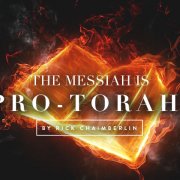

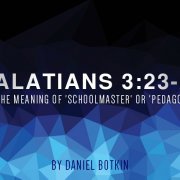
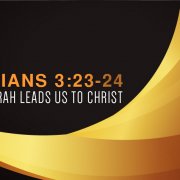

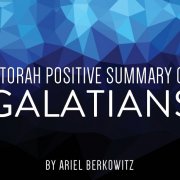
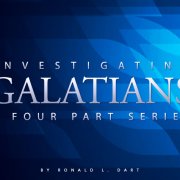
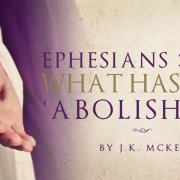


Recent Comments: